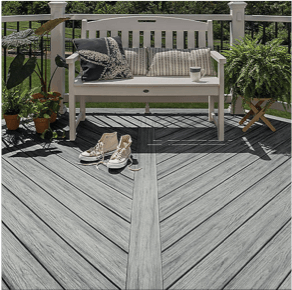Trex Composite Decking vs Treated Lumber
Are you currently in the market for building a deck, or at least plan to be? If so, the first and main thing you should consider is what material you’ll want your deck to consist of. This is absolutely the most controversial decision to make for most customers in search of expanding their outdoor living space, and it really shouldn’t be! A deck is an extension of a homes exterior and is most definitely an investment for all homeowners, and just like any other investment; you expect consistent returns. Trex Composite Decking requires little to no maintenance, is fade and stain resistant, lasts 3x longer than wood, and is the most Eco-friendly option. That’s why Trex is the answer to this dilemma most homeowners face when choosing the type of material they want their deck to consist of.
Trex is the leading decking material for multiple reasons and one of those is how durable and long lasting it is. Trex composite is rot and split resistant and carries a 25 year stain and fade warranty. That means no sanding, staining, painting, etc. whereas wood decks require constant maintenance that can become a hassle. Additionally, the color options offered through the surface and different handrail styles offer complete customization for the home owners to personalize their outdoor living space. Since, Trex decking lasts 3x longer than wood does, which means homeowners who plan on staying in their homes for a while, won’t have to worry about resurfacing their deck, ever!
Wood decking might be more cost efficient in the short-term but in the long-term it can carry a lot of unforeseen problems that are inevitable. Lumber fades and staines easily, showing every spill and scuff, therefore requiring seasonal painting, staining, or sealing. Furthermore, it can become a safety hazard when it rots, splits, and splinters. We all know how much of a pain splinters can be. Additionally, insects can cause extensive structural damage. This is an imperative consideration due to the prevalence of termites and other insects in the south. Moreover, wood decking contributes to deforestation, such as cutting down trees that local wildlife depend on for food and shelter.
Trex is by far the leading material when considering sustainability and environmental consciousness. Trex uses 95% recycled material. Locally sourced reclaimed wood along with recycled plastic film are combined and amount to saving over 400 million pounds of wood and plastic a year. For reference, every 500 sq ft of Trex contains 140,000 recycled plastic bags. Trex doesn’t have to cut down a single tree ever, and that’s why they’re the most environmentally friendly option.
Overall, Trex decking is the most efficient option in the long-run. Even if you didn’t plan on staying in your home for more than 10 years, when it comes time to sell it, Trex deck is going to bring much more value to a home than a wood deck that could already be starting to deteriorate. In conclusion, when it comes to considering a material, Trex pros outweigh wood pros by a landslide and that’s why 912 HomeWorks stands behind Trex.


